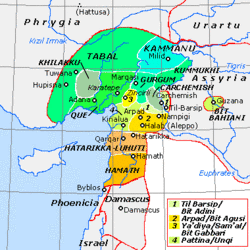Charchemish
| Viceroyalty of Carchemish / Kingdom of Carchemish | ||||||||||
| Karkamiša | ||||||||||
|
||||||||||
|
Carchemish among the Neo-Hittite states
|
||||||||||
| Capital | Carchemish | |||||||||
| Languages | Hittite, Hieroglyphic Luwian | |||||||||
| Religion | Hittite-Luwian religion | |||||||||
| Government | Monarchy | |||||||||
| Historical era | Bronze Age, Iron Age | |||||||||
| • | Established | c. 1321 BC | ||||||||
| • | Disestablished | 717 BC | ||||||||
|
||||||||||
| Today part of |
|
|||||||||
Carchemish (/kɑːrˈkɛmɪʃ/ kar-KEM-ish), also spelled Karkemish (Hittite: Karkamiš;Turkish: Karkamış; Greek: Εὔρωπος; Latin: Europus), was an important ancient capital in the northern part of the region of Syria. At times during its history the city was independent, but it was also part of the Mitanni, Hittite and Neo-Assyrian Empires. Today it is on the frontier between Turkey and Syria.
It was the location of an important battle, about 605 BC, between the Babylonians and Egyptians, mentioned in the Bible (Jer. 46:2). Modern neighbouring cities are Karkamış in Turkey and Jarabulus in Syria (also Djerablus, Jerablus, Jarablos, Jarâblos); the original form of the modern toponym seems to have been Djerabis or Jerabis, likely derived from Europos, the ancient name of the Hellenistic-Roman settlement.
Carchemish is now an extensive set of ruins (90 hectares, of which 55 lie in Turkey and 35 in Syria), located on the West bank of Euphrates River, about 60 kilometres (37 mi) southeast of Gaziantep, Turkey, and 100 kilometres (62 mi) northeast of Aleppo, Syria. The site is crossed by the Baghdad Railway that now forms the Turco-Syrian border. A Turkish military base has been built on the Carchemish acropolis and Inner Town, and access to that part of the site is presently restricted. Most of the Outer Town lies in Syrian territory.
...
Wikipedia

